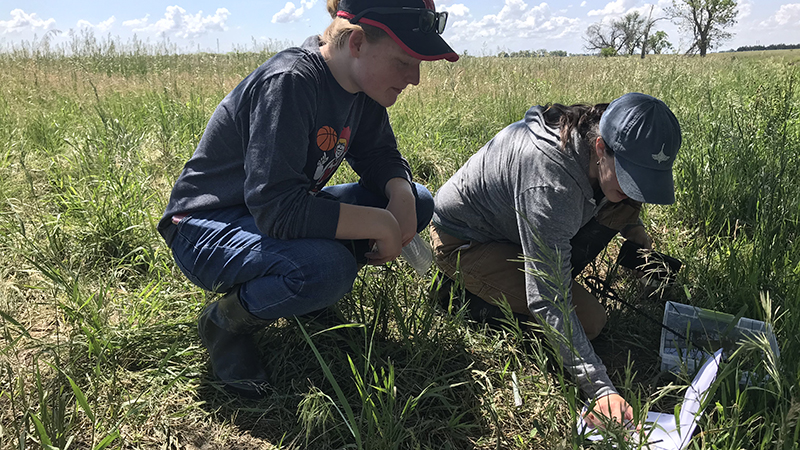Posted: 6/8/2021
Cabela's funding helps SNR undergraduates pursue research projects

Seven undergraduates in the University of Nebraska–Lincoln's School of Natural Resources are conducting conservation-centered research this summer, thanks to $3,000 grants from the Cabela's Apprenticeship Research Project.
Among them is Abigail Schoup, a senior fisheries and wildlife and pre-veterinary medicine major, who will join a research team looking at how wastewater contamination linked to the AltEn ethanol plant near Mead has impacted frogs.
"I will be working with frog species to analyze the impacts pesticides may have on these species, " Schoup said. "Amphibians, including frogs, are great sentinel species for informing the way that other animal species and even humans may react to pesticides in their environment. By working with many other researchers, we hope to study the impact of pesticides in the broader ecosystems and environments surrounding Mead and how this contamination may impact the health of the environment, animals and humans. "
High levels of pesticides and fungicides have been detected in wastewater at the AltEn site. In early February, state regulators ordered the plant closed until a plan was made to safely dispose of the wastewater and repair lagoons. After the closure, a pipe connected to a 4 million-gallon digester tank ruptured, and wastewater traveled more than 4 miles downstream from the plant. Numerous questions about the plant's environmental impact remain.
Schoup said the Cabela's funding is helping her purchase testing supplies and equipment while also providing her a wage for her work.
"This is very helpful, since I would otherwise likely not be able to afford room and board in Lincoln for the summer," she said.
Christopher Chizinski, associate professor in the School of Natural Resources, said the Cabela's apprenticeship has allowed SNR undergraduates to immerse themselves in research projects that reflect their personal and professional interests. Students work with faculty mentors, partner agencies or nonprofits to get their projects to the finish line.
"Students are given the space to delve into their interests, whether it’s Nebraska fur trappers, hyenas in Africa or birds in the Prairie Corridor, " Chizinski said.
With the Cabela's funding, Callie McCright said she is able to focus more on the research and development of the project she is pursuing — an effort to mitigate nitrate and phosphorus water contamination with both biological and chemical approaches. The biological approach suspends floating wetland species in a framework that allows submerged roots to take in nitrogen and phosphorus from the water, while microbes on the plant roots convert nitrate to nitrogen gas. The chemical approach utilizes lanthanum, a soft metal that can be used to remove phosphorus from the water column.
Removing nitrogen and phosphorus from water supplies is one of the most prevalent water quality issues in the Midwest, McCright said, and the research funding will allow her to learn about environmental remediation in the field after building experience working in Professor Steven Comfort's lab starting last October.
"After learning about Dr. Comfort’s research, I arrived at my own questions and began designing experiments, " said McCright, a senior fisheries and wildlife and environmental restoration science major. "By developing my interests and working with Dr. Comfort and his team, I found my passion and project. I am excited to work in a group with similar interests and have the opportunity to conduct my own experiences and refine my goals. "
The funding, she said, allowed her not only to purchase needed materials, but to secure housing near the lab and field sites where she’ll be spending much of her time.
Jay Cleveland, a junior fisheries and wildlife and grassland ecology and management major who will be working on the Urban Wildlife Information Network Project, said his Cabela's funding allows him to purchase supplies for data collection, analysis and travel expenses as he works to improve wildlife education in urban communities to help people and wildlife coexist in cities.
Schoup said her project is the perfect intersection of her interests.
"Through this project, I get to focus on field work, research, wildlife and animal health, which are all areas that I hope to pursue in my future career, " she said. "I was also interested in this particular part of the project because I am not as familiar with amphibians as I am with other wildlife species. I saw this project as a great opportunity to expand my knowledge and gain experience in a field that I haven't explored before, while also preparing me for the career that I hope to have someday. "
The four other SNR students who received Cabela's research grants are:
Brenna Krueger, who is researching edible plants and mushrooms in prairie corridors.
Brittni McGuire, who is censusing seedlings and collecting environmental data along gradients in the forested canyons of the Niobrara Valley Preserve.
Jordan Springer, who is researching prairie violet populations.
Alexis Moss, who is studying a genetic mutation found in the plains garter snake.
—Cory Matteson, SNR Communications